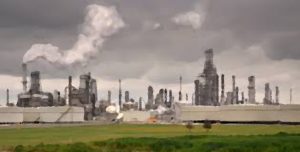(Originally published in Bharatiya Pragya, Vol. 15, No. 06, June 2010, pages 31 – 34.)
Industrial civilization, which began 150 years ago, is entering a decisive phase now as the resources run scarce to satisfy its ravenous appetite. Human society, living an industrialized life has used up resources which took nature millions of years to build up. How long our earth and environment can support this reckless living is a question now.
Human beings constitute a very insignificant portion of the cosmos and acting up like masters of the universe is just an illusion. Thinking that we can fight nature is a hallucination. Living a life in harmony with nature and our environment is the only way of life which will last, last long enough to pass the test of time.
On many fronts, the crumbling of this colossal industrial setup is becoming apparent. One on the forefront is peak oil or upcoming oil shortage. Oil is the lifeblood of modern civilization. Choke off the oil and it quickly ceases.
With no viable alternatives in sight, human society is facing today a great crisis of unprecedented scale. All the previous calamities were local in nature. Oil crisis would be a global disaster because the world today shares a common fate, thanks to interdependence and inter-connectivity. Earlier we suffered in isolation and now we go down, all together. There are food riots in Africa when America decides to produce bio-fuels. When there are skirmishes in Nigeria, a government is toppled on other side of the globe.
The solution lies in aligning ourselves with nature rather than trying to put up a brave front. So called victory over nature is just a garbed defeat. We have to recognize the problem as over-consumption and not as overpopulation.
President Bush, before the elections, aptly admitted and endorsed this view when he described the present times for America and rest of the world as “very difficult times, very difficult.”
Before the present lull, the headlines were blaring like “Shell chief fears oil shortage in seven years,” “Specter of food rationing hits US amidst global food crisis,” “Futures Market Traders Bet On $200/Barrel Oil In 2008,“ “Oilcos plan to ration fuel supply,” “British truckers protest rising fuel prices,” and ”Oil shock: Airlines cut flights, expansion plans.”
Stopgap solutions cannot help as the nature and environment cannot be cheated. In trying to do so, we end up cheating our own selves. We have to get to the root of the problem which is an unsustainable life style, life style with hardly any reverence towards nature and its creator.
Oil is flowing in our veins today
We have allowed oil to become vital to virtually everything we do.90% of al our transportation, whether by land, air or sea, is fuelled by oil. 95% of al goods in shops involve the use of oil. 95% of all our food products require oil use.
Thus the three main purposes for which oil is used worldwide are food, transport and heating. In the near future the competition for oil for these three activities will be raw and real. But still reliable supplies of cheap oil and natural gas underlie everything we identify as the necessities of modern life—not to mention all of its comforts and luxuries: central heating, air conditioning, cars, airplanes, electric lights, inexpensive clothing, recorded music, movies, hip-replacement surgery, national defense—you name it.
Imagine a day of your life without oil! Well it’s almost impossible to escape oil’s influence for even a single day in our lives. Did you wake up to a plastic alarm clock after a restful night? Thank petroleum for the mosquito repellent, both bottle and liquid. And did you put on your eye glasses? Then you started your this day with petroleum too. The frame and plastic lens owe their origin to oil. When you get ready to shave, your shaving cream, razor body and deodorant contain petroleum products as important ingredients. Yo our bathroom PVC door and toilet seats – where do they come from? You guessed it right. Then comes toothbrush – an outright petroleum based product. And toothpaste—with petrochemical-enhanced artificial coloring and mineral oils. You are living with oil in your mouth if you are wearing dentures as they are mostly petroleum based. After shower when you put your lip balm, you have used a petroleum product once again.
While still in shower, you rush to answer a phone call, and it is all oil based plastic. Suddenly your tiny tot requires a change of diapers and its linings are feathered by petroleum too. After shower, when you put on your formals, you are again draped in oil because all synthetic fabrics originate from oil. And then when you put on your leather shoes with synthetic soles, once again you step into the realms of oil. Then you quickly spray perfume. It’s oil too. Then to avoid drizzle, you put on your raincoat and lo and behold! You have added another layer of oil on your existence.
But what about streets? You guessed it right! Streets are paved with asphalt, a sticky by product remaining after refining crude oil. Of course no need to discuss what goes in your car to run and lubricate it. In your office canteen, your breakfast comes off a non-stick pan and this too is a petro-product. Of course food production and transport is also at the mercy of petroleum because most of the fertilizers and pesticides are harvested from oil. Then as you insert a CD or DVD, you have handled oil once again. So is with your credit and debit cards, bunch of which your wallet holds. And the same again with your wallet whether it is leather or rexine. Leather too requires petrochemicals for tanning and processing. Well if all this is beginning to give you a headache and you would like to pop in an aspirin, guess where it comes from. Answer again would be the same.
Petroleum follows you when in the evening you head for a round of golf. Yes, the ball is practically oil solidified. We are merged or shall we say drowning, from toe to head, in an ocean of oil. Unfortunately this ocean is limited in its dimensions and full of fearsome waves of uncertain supplies. Thus almost every current human endeavour from transportation -to manufacturing, to electricity, to plastics, and especially, to food production is inextricably intertwined with oil and natural gas supplies.
World energy forecast: Bleak future
At present the heavily industrialized United States, with only 5% of the world’s population, is using more than 40% of the world’s energy output. But how long can this situation last? To catch up to the United States, the rest of the world is racing to industrialize, but the world’s limited energy reserves make the end of the energy bonanza inevitable.
There is a Saudi proverb which says, “My father rode a camel; I drive a car; my son flies a jet; his son will ride a camel.”
Carl Jung, one of the fathers of psychology, famously remarked that “people cannot stand too much reality.” And one such reality is that we have to bid goodbye to oil one day. It’s not a question of what or if, but just a question of when. And the thing is, we don’t have to run out of oil to start having severe problems with industrial civilization and its dependent systems. We only have to slip over the all-time production peak and begin a slide down the arc of steady depletion. In other words, we won’t have to run completely out of oil to be rudely awakened. The panic starts once the world needs more oil than it gets. The key event in the Petroleum Era is not when the oil runs out, but when oil production peaks. Just like they thought that the Titanic was unsinkable. The upcoming end of cheap oil seems to have surprised markets. The exponential increase in demand for fossil fuels seems to have come as an unpleasant surprise. The alternative sources of power: solar, wind, nuclear, tidal, etc., are not as energy dense, portable, or as readily usable as fossil fuels. History tells us that complete development of new energy sources (coal and oil in the past) takes a long time, at least about half a century. The peak in fossil energy extraction will expose the fallacy of limitless growth.
Recently in the US, the National Petroleum Council, a body of 175 authorities that reports to the US government, presented a 420-page report which is considered the most comprehensive study ever carried out into the industry including the heads of the world’s big oil companies, including ExxonMobil, Chevron, ConocoPhillips, Occidental Petroleum, Shell and BP. The report concludes that the global supply of oil and natural gas may run short by 2015.
The solution
It’s now or never. We stand at the crossroads today. Time to act is now. A stitch in time saves nine. We have to change the basic philosophy of life, change the way we live. We have to do away with extravagance and materialistic worldview. We have to spread the awareness and make masses conscious of the problem coming head on in our direction. Many of our short sighted politicians and officials are simply busy filling their coffers and we cannot expect any concrete measures from them. This is the time to build a mass opinion to save our planet, to save our resources. It is surprising that so little awareness exists about this cataclysm and so little is being done about a problem which can choke the very life line of our civilization, both on official as well as grass-root levels. People are going about their chores, driving around in SUVs, hopping about in jets, as if nothing has happened and as if the government will just handle everything, come what may. Reality is that we can no longer take cheap energy for granted. And at national and international levels, energy planning has to percolate into our lives. Every short walk, every cycling scuttle, every switching off a light or turning off a tap will give extra lease of life to human society.
Tony Blair, former British Prime Minister, while speaking on energy and environment in October 2006, rightly put it: “We have a window of only 10 to 15 years to take the steps we need to avoid crossing catastrophic tipping points.”

